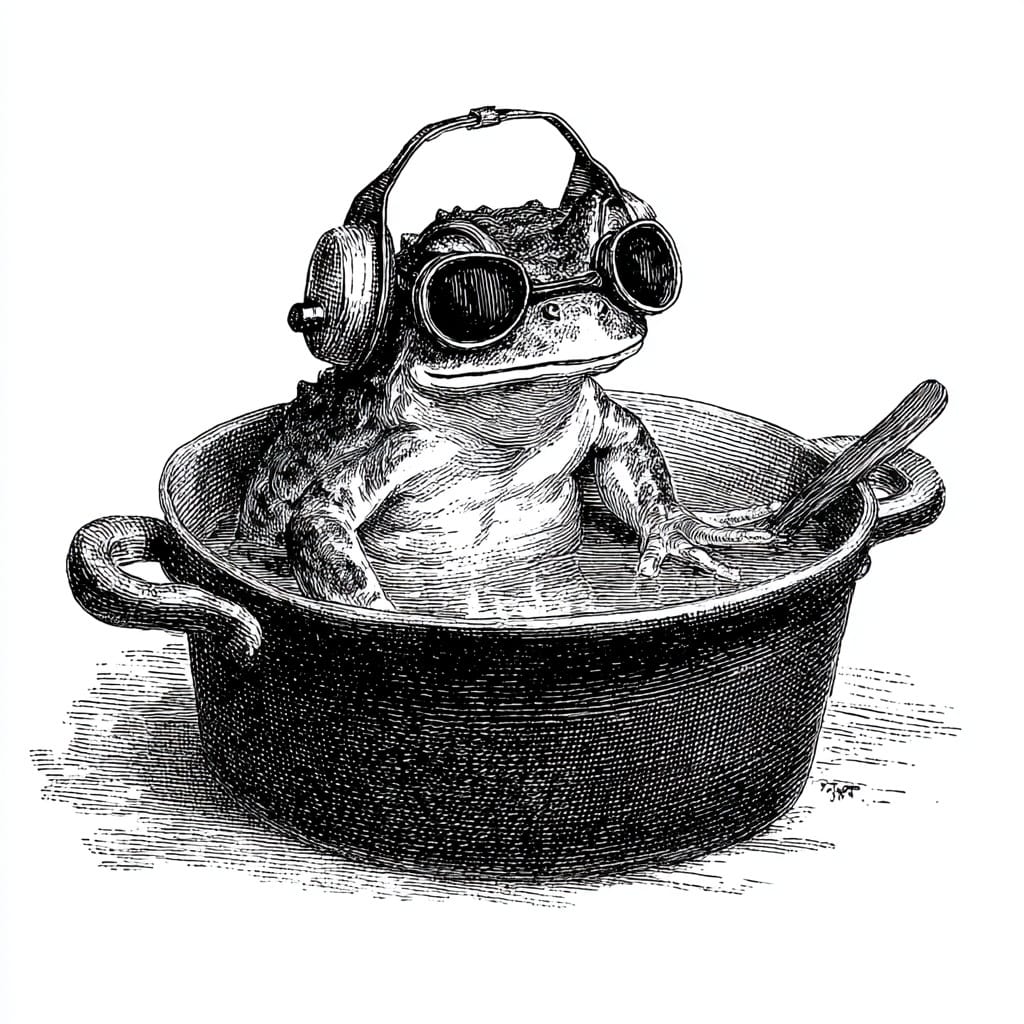A Time for Lunatics

Last Wednesday, I promised you a historical precedent for the kind of collective practice I think we need in times of change of this magnitude…
Between 1765 and 1813, a small group calling themselves "lunatics" met monthly in Birmingham during the full moon.
They claimed the extra light made the journey home safer.
The Lunar Society brought together an unlikely mix: Matthew Boulton, the industrialist. James Watt, the engineer. Erasmus Darwin, the physician-poet. Joseph Priestley, the radical scientist. Josiah Wedgwood, the potter.
Fourteen core members. Never more. No formal structure, no officers, no minutes. Just conversation, experiment, and relentless cross-pollination of ideas.
What they created wasn't the steam engine, industrial pottery, or the discovery of oxygen. They created the conditions for the Industrial Revolution itself, the fusion of science, commerce, and social transformation.
Why They Succeeded
Three things made them extraordinarily effective. Each one challenges how we think about professional development today.
They were genuinely cross-disciplinary.
Not specialists from different fields meeting briefly to share updates. People who actively learned from each other's domains. Wedgwood used his potter's kilns to advance Priestley's chemical experiments. Darwin's theoretical biology informed Watt's mechanical engineering. Boulton's manufacturing expertise shaped everyone's inventions toward practical application.
The value wasn't in individual expertise. It was in the collision between perspectives.
Where the potter's understanding of materials informed the engineer's approach to systems to create breakthroughs. Where the physician's knowledge of bodies shaped the industrialist's thinking about factories and the transformation of production.
They didn't collaborate occasionally.
Members local to Birmingham were in almost daily contact. Those more distant corresponded at least weekly. The monthly meetings were social anchors. The real work happened in the ongoing exchange between sessions.
They were practitioners, not theorists.
Every member had skin in the game, commercial, scientific, and social. They bore the consequences of their ideas. This wasn't gentlemen's philosophy or academic speculation. It was knowledge refined through consequence.
When Darwin theorised and Boulton manufactured, theory met reality immediately. Bad ideas failed fast. Good ideas improved through iteration. The feedback loops were tight because the stakes were real. Priestley's chemistry wasn't confined to laboratory journals, it informed industrial processes that either worked or didn't. Watt's engines either generated power efficiently or consumed more coal than they saved.
This integration of theory and practice created a particular kind of wisdom. The type that knows which principles hold under pressure and which are merely elegant on paper. They also maintained something rare: deep roots with a light touch. Each member possessed profound expertise in their own domain whilst remaining deliberately open to insights from outside it. Specialists who refused specialisation's blinders.
Darwin was a physician who wrote poetry and studied evolution. Wedgwood was a potter who advanced chemistry and campaigned for canals. Priestley was a cleric who discovered oxygen and supported political revolution. None of them stayed in their lane. Yet none of them were dilettantes either; their explorations outside their primary domain were informed by mastery within it.
This combination is rare. We tend to produce either narrow specialists who know more and more about less and less, or broad generalists who know a little about everything but master nothing.
The Lunatics achieved something harder: deep expertise combined with genuine curiosity about adjacent domains.
Lunacy by Design
The Lunar Society didn't happen by accident. It required specific conditions.
Proximity. Most members lived within a few hours of Birmingham, enabling regular interaction. Not incidental. Essential. The tight feedback loops, the ability to continue conversations, the deepening trust, all depended on regular face-to-face engagement over years. Geography mattered. Ideas developed through repeated exposure, not single interactions.
You can't build the kind of trust required for genuine critique through quarterly video calls.
Curation. Deliberate selection of diverse but complementary members. Not everyone who wanted to join could. The society remained small, never more than fourteen core members, because effectiveness required both diversity and coherence. They understood something we've forgotten: quality of interaction matters more than quantity of connections. A tight network of people who genuinely engage beats a loose network of people who merely connect.
Time. Fifty years of sustained engagement. Not quarterly meetings or annual conferences. Decades of accumulated trust and shared learning.
Craft develops slowly. The Lunar Society gave it room to develop. Consider what fifty years means. Members watched each other's children grow up, married into each other's families, supported each other through failures and celebrated successes. This depth of relationship enabled a particular quality of conversation, one where you can challenge someone's thinking without threatening the relationship, because the relationship is bigger than any single disagreement.
Economic alignment. Members supported each other's commercial ventures, creating material interdependence alongside intellectual collaboration. When Watt needed capital to develop his engine, Boulton provided it. When Wedgwood needed scientific expertise, Priestley supplied it.
Success was mutual, not competitive. This wasn't charity or networking. It was recognition that their fates were intertwined. Making each other successful made everyone more capable. The pie wasn't fixed, collaboration expanded what was possible for all of them.
Shared values. Jacob Bronowski wrote of them: "What ran through it was a simple faith: the good life is more than material decency, but the good life must be based on material decency." (Ascent of Man, Chpater 8)
They weren't naive idealists. They made money, built businesses, competed in markets. But they operated from a foundation of shared purpose that transcended individual gain. This alignment of values created coherence even when their specific projects diverged.
What Destroyed Them
The Lunar Society lasted fifty years. What ended it wasn't internal dysfunction but external political pressure. The Priestley riots of 1791, a backlash against their support for the French Revolution, saw mobs destroy Priestley's house and laboratory. Within a few years, key members had died, moved away, or been driven into exile. The political climate became hostile to the kind of radical thinking and cross-boundary collaboration they represented.
They were vulnerable precisely because they were effective. Their ideas threatened established power. Their cross-pollination generated insights that couldn't be controlled. Their commitment to social transformation made them dangerous to those invested in the status quo.
This matters. Genuine craft communities, ones that actually develop new capabilities rather than reproducing existing hierarchies, make people uncomfortable. They should. They're building capacity that doesn't depend on institutional permission or credential validation.
They are about change, not permanence.
Why This Matters Now
We need modern equivalents. Not to recreate the Lunar Society exactly, they were homogeneous white men of means, limited by their era's hierarchies and prejudices. But to capture its essence: the conditions that enabled transformation.
Spaces where practitioners from different domains genuinely learn from each other. Where theory meets practice with real consequences. Where craft develops over months and years, not weeks. Where economic mutual support creates resilience. Where shared values provide coherence.
This is what the Athanor attempts. Not a recreation but a translation, taking principles that worked in 1765 and adapting them for 2025.
What's the Same
We're building around the same core conditions: cross-disciplinary collision, practitioners with skin in the game, long-term commitment over quick wins, economic mutual support, conversation as primary method.
We run experiments in our own practices, similar to how they conduct experiments in their workshops and laboratories. We share what we learn, like they corresponded and met monthly. We support each other's commercial work, like they funded each other's ventures.
What's Different
We're deliberately diverse where they were homogeneous. We're globally distributed where they had geographic proximity. We're explicitly designing for serendipity where they stumbled into it. We're conscious about power and inclusion where they weren't.
We face different challenges. They were building the Industrial Revolution; we're navigating its consequences and the emergence of AI. They were integrating steam power into commerce; we're figuring out what remains valuable when algorithms can handle routine work.
We also have advantages; used well, technology compresses distance and time. We know that relationships of deep trust can be built remotely, and that they requires sustained effort and commitment.
But the fundamental insight remains: craft develops through sustained practice in community with others who take the work seriously. Not through content consumption. Not through credential collection. Through doing actual work, bearing actual consequences, and learning from people who will tell you when you're wrong.
On Thursday, we'll start to explore what this actually means in practice, what happens in the Athanor week by week, month by month.

Comments ()